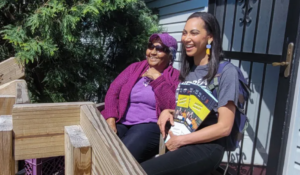Tennessee’s first summer learning camps yield improvements in reading and math, governor says

Tennessee public school students who participated in recent summer learning camps showed improvement in reading and especially in math, based on test results released on Wednesday.
Gov. Bill Lee’s administration reported an overall improvement of nearly 6 percentage points in English language arts and more than 10 percentage points in math for students who attended the six-week camps.
About 120,000 students in grades 1-8 — or 20% of those who were eligible — enrolled in the voluntary camps that districts were required to host under a new law aimed at recouping pandemic-related learning loss. The state picked up the $135 million tab, including $18.5 million to provide bus transportation.
“We know it’s been a tough year, but we’re very encouraged by this data that shows that swift action did pay off,” Lee said during a conference call with reporters.
Tennessee has been one of the most aggressive states in the nation in trying to address declines in student proficiency as the pandemic creeps into a third straight academic year. In January, Lee called a special legislative session for lawmakers to focus on K-12 education and approve initiatives to launch summer camps, after-school tutoring, and phonics-based literacy instruction.
State test scores released in August further illustrated the need to bolster student achievement. Those results, from tests given last spring, showed overall student proficiency declined 5 percentage points since 2019, the last time the state administered standardized tests under the Tennessee Comprehensive Assessment Program, also known as TCAP. It marked a dramatic reversal of previous gains.
To measure progress during the summer camps, the state used a much simpler measurement — giving students 10-question tests anchored in the state’s academic standards at the start of the camps and then at the end. The camps required six hours of daily instruction in reading and math five days a week.
The state reported that improvement was markedly higher for elementary school students than for middle schoolers.
In math, elementary school students saw an improvement of nearly 12 percentage points — double the performance of middle school participants.
In reading, elementary grades showed an improvement of over 7 percentage points, compared to 1 percentage point for middle school students.
Overall, economically disadvantaged students improved at generally the same rate as their more affluent peers, Education Commissioner Penny Schwinn told state lawmakers later Wednesday during a hearing to discuss the results.
“That’s a really big deal, because typically what we see is our economically disadvantaged students improve at a slightly slower rate,” Schwinn said.
State officials did not release detailed attendance data, but Schwinn reported that 96% of enrolled students attended for one or more days. Attendance was higher in elementary schools than middle schools.
Registration priority was given to students who generally scored below proficient in math or reading on their most recent TCAP tests or another state test used to identify students needing early intervention. The program also prioritized students eligible to benefit from federal funding intended to help poor working families.
Asked for more details about the testing data, a department spokesman said less than half of participating students took both tests. Schwinn called that a representative sampling and also said the 10-question assessment was the right tool to measure improvement over the summer.
“I do not think it’s appropriate to give students a 3-hour test at the beginning and the end of a summer program,” she told reporters, adding that the assessments gave her department “a directional sense on improvement.”
“I feel strongly that we absolutely saw academic benefits,” she said, noting ancillary benefits in student confidence, engagement and — for those returning to in-person instruction after a year of remote learning — preparation to re-enter classrooms.
But House Democratic Caucus Chairman Vincent Dixie said “it’s a little early for a victory lap.”
“I think the sample size of the students who attended summer school is pretty small and I’d wait until we find out more about this school year and the 1 million students who have struggled this year through the COVID-19 pandemic,” the Nashville lawmaker said in a statement.
At Wednesday’s hearing, several district leaders told lawmakers they believed the inaugural camps were successful — and that local flexibility on staffing and scheduling was key.
“There is no one size fits all,” said Danny Weeks, superintendent of Dickson County Schools.
Weeks and Cleveland City Schools Superintendent Russell Dyer asked for continued leeway to make adjustments as the program continues next summer, emphasized the importance of providing transportation to encourage student participation, and asked the state to consider increasing pay for teachers beyond $1,000 a week, which is basically the salary of a beginning teacher.
The state already is getting a return on its investment, they agreed, especially for struggling students that the program targets.
“Having our students come to school during the summer – having those fun learning experiences – absolutely made a difference when they came back in the fall,” Dyer said.
This article was originally posted on Tennessee’s first summer learning camps yield improvements in reading and math, governor says





